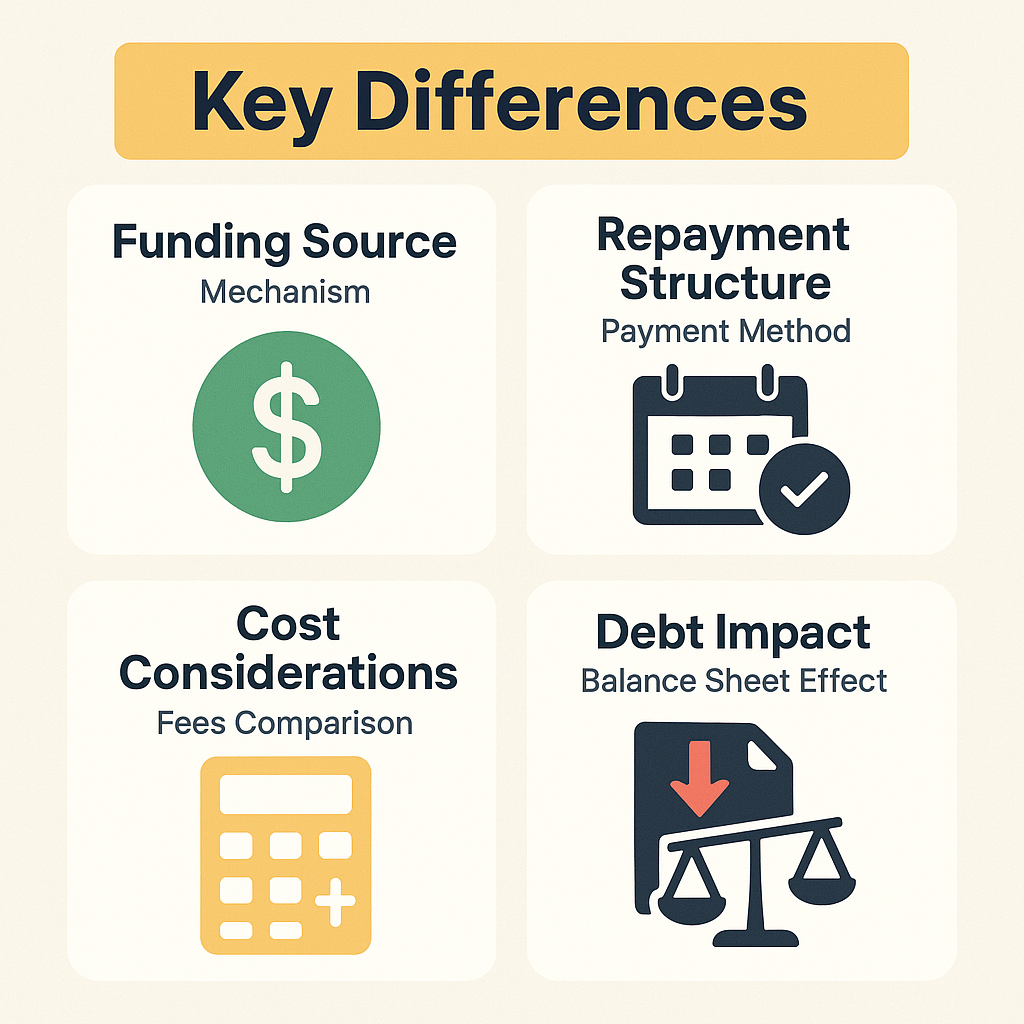Small business owners facing cash flow challenges often find themselves choosing between different receivables-based funding options. Two popular methods include merchant cash advances and invoice factoring, each offering distinct advantages and potential drawbacks for your business financing needs.
Key Differences Between MCA and Invoice Factoring

Understanding the key differences between MCA and invoice factoring helps business owners make informed financing decisions. These receivables-based funding options operate through different mechanisms and offer varying levels of cash flow control.
- Funding Source: Merchant cash advances provide funding based on future credit card sales, while invoice factoring converts unpaid customer invoices into immediate cash
- Repayment Structure: MCAs typically require daily or weekly automatic deductions from your bank account, whereas factoring involves selling your invoices to receive funds upfront
- Cost Considerations: Invoice factoring often involves lower fees compared to merchant cash advances, which may charge higher rates for the convenience of quick funding
- Debt Impact: Factoring generally does not create debt on your balance sheet since you're selling an asset, while MCAs may appear as advances against future revenue
- Business Requirements: MCAs work best for businesses with consistent credit card sales, while factoring suits companies with outstanding invoices from creditworthy customers
Repayment Flexibility and Cash Flow Control
Repayment flexibility and cash flow control vary significantly between these two financing methods. Each option affects your business operations differently and requires careful consideration of your company's financial patterns.
- Predictable Terms: Invoice factoring typically offers more predictable repayment terms since you know exactly which invoices are being factored and their amounts
- Automatic Deductions: MCAs often involve daily automatic deductions from your business account, which may strain cash flow during slower periods
- Collection Process: With factoring, the factor company may handle collections directly from your customers, reducing your administrative burden
- Seasonal Flexibility: Factoring can better accommodate seasonal businesses since funding depends on actual invoices rather than projected sales volume
Choosing the Right Financing Method
Choosing the right financing method requires evaluating your business model, customer base, and financial needs. Consider these factors when deciding between these receivables-based funding options:
- Evaluate Your Revenue Patterns: Analyze whether your business generates more revenue through credit card sales or invoiced customers to determine the most suitable option
- Assess Cost Tolerance: Compare the total cost of funding including fees, interest rates, and potential impact on profit margins
- Consider Time Requirements: Determine how quickly you need funding and whether you can wait for the factoring approval process or need immediate MCA funding
- Review Customer Relationships: Consider whether you're comfortable with a factoring company potentially interacting with your customers during the collection process
- Plan for Repayment: Ensure your cash flow can accommodate the chosen repayment structure without creating additional financial strain
Making an Informed Decision
Making an informed decision about MCA vs invoice factoring requires understanding your specific business circumstances. Each financing method serves different business models and financial situations effectively.
Invoice factoring might work better for businesses with strong invoicing systems and creditworthy customers. This option typically provides lower fees and may improve cash flow without creating traditional debt obligations on your financial statements.
Merchant cash advances could suit businesses with high credit card transaction volumes who need quick access to funds. However, the daily repayment structure requires careful cash flow management to avoid potential strain during slower business periods.
Consider consulting with financial advisors or speaking with multiple providers to understand the specific terms available for your business. Compare offers carefully, focusing on total costs rather than just upfront funding amounts.
Both merchant cash advances and invoice factoring offer valuable receivables-based funding options for small businesses. The right choice depends on your specific business model, cash flow patterns, and financing needs. Take time to evaluate the costs, repayment terms, and operational impacts before making your decision.

.png)






